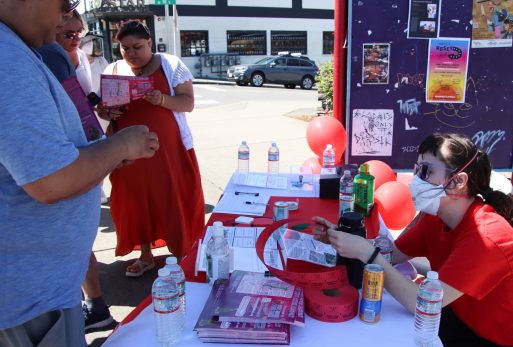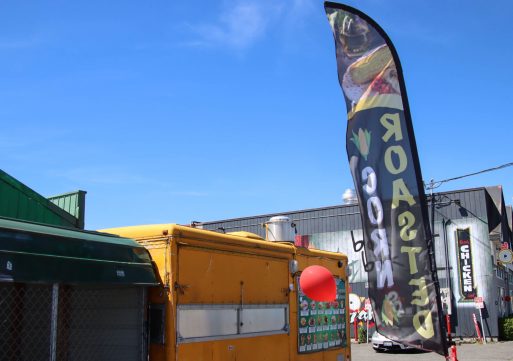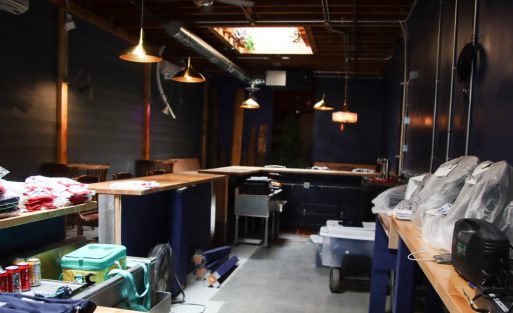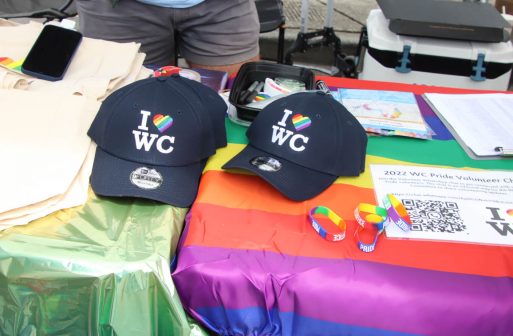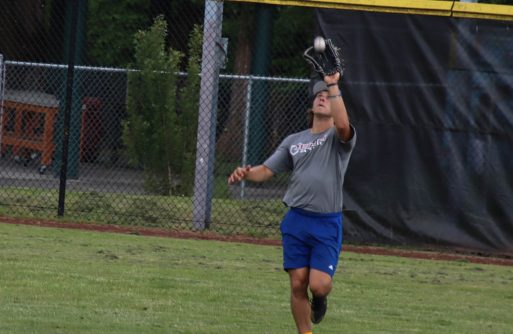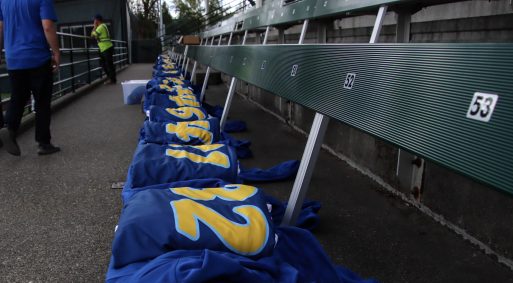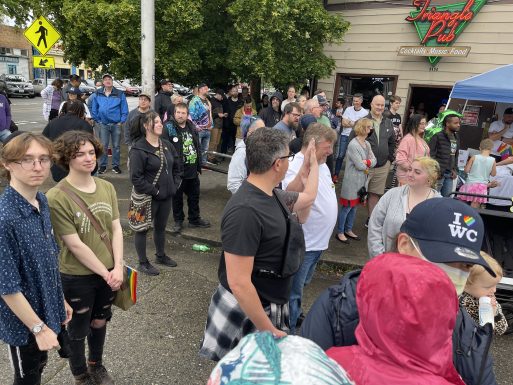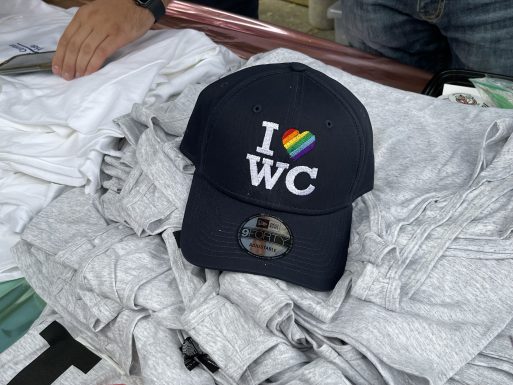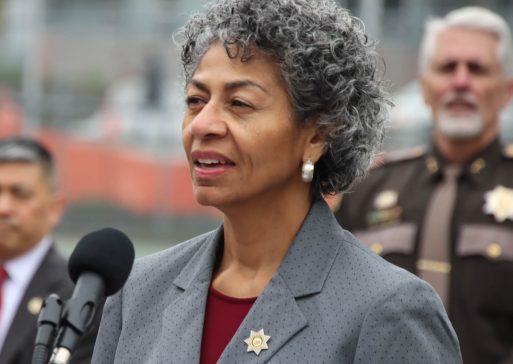By Tracy Record
White Center Now editor
Public safety was the central theme of the North Highline Unincorporated Area Council‘s last meeting before summer hiatus, held online Thursday night.
The first guest was newly confirmed King County Sheriff Patti Cole-Tindall.
NEW SHERIFF: She began with her history, coming to the job with a “non-traditional” background, starting off as a law-enforcement officer 30 years ago but then taking “a different path” for a while. In 2010, she became Director of Labor Relations for King County; in 2014 she took on law-enforcement oversight, and in 2015 joined the Sheriff’s Office. In 2020, then-Sheriff Mitzi Johanknecht appointed her as Undersheriff, and now after County Council confirmation, she is the official permanent sheriff, as of May 24th. She said her background gives her a “different lens” and an ability to ‘bring something that is different and unique” that residents want.
As for what she envisions from here, “the effort to rebuild and reestablish relationships” – with the community, with other county departments, and with the KCSO employees, after four years she described as “difficult.” She says frequent communication, listening sessions, a monthly video for employees, and other things are helping that rebuilding. “I really look at it as, everybody is helping us move things forward … the other thing we’ve dedicated time to is” connecting with community in a new way. That includes partnerships with various community agencies, to solve problems that can’t just be solved by law enforcement alone. “Community groups can be pivotal and key in ways to identify solutions.” She plans to create Community Action Councils (as she mentioned at the White Center event announcing her nomination for the job). “I really believe that at this place, this time, we have so much opportunity to work with the community.”
Asked to elaborate on her mention that employees weren’t pleased with the way things were going in the past four years, she says she feels the two charter amendments’ passage, rendering the previous sheriff a lame duck, was partly to blame, as well as the previous administration’s communication style. The 2020 protests “were tough on people,” as were firings/resignations based on vaccine non-compliance. “There was this animosity toward the police … police (felt) not supported.” Overall, she said she and her team has been working “to change that … being present … I really believe we are seeing the tide turning. … We want to make the King County Sheriff’s Office … a premier law-enforcement agency.”
That includes hiring – 113 vacancies out of 778 deputy positions, and 58 professional openings. They’re offering a $15,000 bonus for lateral transfers, %7,500 for new officers. $5,000 for referrals. “But (current employees are) not going to refer people if they don’t feel this is a good place to work.” That has meant some policy changes – like allowing facial hair. “I believe our best recruiters are our current staff.”
What are the qualifications? At least 21 years old by the time you complete the academy. College degree not required. People skills are good – “you have to be willing to communicate …. a lot of this job is communication.” Go to the KCSO website to find qualifications and disqualifications listed. (No maximum age, she added.)
Undersheriff Jesse Anderson introduced a new Southwest Precinct commander, Major Mark Konoske. Then Anderson spoke to “all the horrific tragedy that’s been happening in our country” for those wondering “what are we doing about it?” – he said he’s spoken to supervisors in the field and needs to get people back into training for those kinds of situations. They especially have to be prepared for how they’d handle a crisis with a limited amount of resources. Training lapsed while schools were closed for COVID. Like Seattle Police, KCSO has redeployed some specialty-unit deputies into patrol. “I’m hoping we can turn this around … it’s time to get a grasp on it and get things back in line with more of a normal and safe society.”
NHUAC’s Barbara Dobkin asked Sheriff Cole-Tindall how much time she’s spent in White Center and what she knows about it. “I don’t know a lot,” she admitted, but did a ridealong recently. She added that she used to work in south West Seattle (Westwood).
Asked if legislators had “tied their hands,” Undersheriff Anderson said some bad laws had been made that led to a lot of “lawlessness,” but the most-recent session “fixed a lot of that.” He said KCSO has had a restricted pursuit policy anyway. “They are listening to law enforcement now, whereas before they were not.”
Another question – if people are getting arrested, nothing’s happening to them, at least in the public perception – what’s up with that? “If you don’t have a consequence for the action, it’s going to keep happening.” They pointed that question to Deputy Bill Kennamer, who agreed it’s ‘very frustrating” for officers like him, especially because of continuing COVID-related booking restrictions at jail. “We need to open the jails.” Asked if there’s anything community members can do, the sheriff suggested writing to elected officials. “You write, you call, testify when you have an opportunity – express your concerns. They do listen to their constituents.”
The undersheriff added that county officials want to be sure they’re not criminalizing homelessness, but that’s “missing the reality of where we need to restore the order and hold people accountable for bad behavior” if they are committing crimes. “We want to help people who need help, but we also want to hold people accountable.”
NHUAC’s Liz Giba asked what they see as next for North Highline. What happens whenever Deputy Kennamer finally retires – is there a commitment to community policing? Major Konoske said they would look for someone who could replace him and have him “overlap with Bill so they can learn from Bill.”
In closing, Sheriff Cole-Tindall said, “Anything you feel you need from us, feel free to reach out to us.”
FIRE CHIEF: Mike Marrs followed, with topics including the fact this is the first year of the fireworks ban. They’ve been working with other departments to figure out what enforcement will look like. For “all but the most egregious violations,” this will be an “informational” year. They’ll be lobbying for more resources to help enforce in subsequent years. They’ve had yard signs made that say “Respect Your Neighbors, Respect The Ban.” He added, “I’m hopeful this message” – sponsored by the King County Fire Chiefs Association – will catch on. They’re ordering about 100 and you’ll be able to pick one up at the fire station soon.
Who’s going to do that informational notification on the 4th? For one, they’ll take complaints and refer to Code Enforcement, which will have a handout. They haven’t worked out other details. Local Services added a link to this page with a way to report violations overnight. There’ll be a fireworks hotline for leaving messages starting June 14th – you’ll leave a message – 206-848-0800 will be the number. On that date, there’ll be a “fire and summer safety event” in Skyway with more info to kick it off. The hashtags will be #CutTheFuse and #DontBlowIt.
In subsequent Q&A, the chief expressed concern that all this extra spring rain will lead to a lot more vegetation that’ll fuel fires.
He also was asked to talk about how the Fire Department will be affected by the Subarea Plan. He said they’re most concerned about population increases leading to higher call volumes and lower revenue due to more tax-exempt property. (The fire benefit charge has only gone so far in helping with that.) “That becomes a challenge for us.” Some areas of increased density may have a reduced water flow – “it may be adequate but there are areas … that have inadequate water flow.” He’s also concerned about road standards supporting emergency-response routes, and cited the narrow streets in areas such as Greenbridge and Seola Gardens. “It’s very difficult when it’s raining and 2 o’clock in the morning to navigate” some of those narrow streets. Also, taller buildings means a need for equipment that can pump water to higher floors.
LOCAL CRIME UPDATE: Deputy Kennamer showed the latest stats – many have gone down. In one declining category, larceny, he said the colleague who helped put the stats together says catalytic-converter thefts have dropped in a big way. Gun crimes have gone up – mostly non-injury cases.
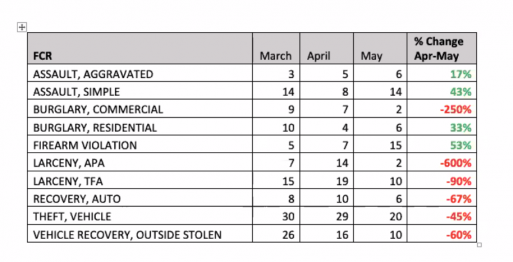
The new precinct commander said they are working on a dashboard to make more data available to deputies. It will help them proactively patrol – seeing what is historically happening and where – as time allows. “It’s going to be a tool that’s pretty fantastic.” He’s expecting it to be online within a few months.
Deputy Kennamer also mentioned that a marijuana store, Star 21, was shut down – he said, by the Liquor and Cannabis Board.
In Q&A, he was asked about a nuisance house at 18th/100th. “There’s definitely movement” toward action, he said. He added that the house might soon be sold.
TEEN PROGRAM: Darlene Sellers talked about everything that’s happening, including the upcoming job fair, and a basketball tournament days later. Fifteen local teens are being hired to work in the summer program at the Log Cabin at Steve Cox Memorial Park.
WHITE CENTER KIWANIS: Scott Davis reminded everyone that the pancake breakfast is coming up 8 am-noon July 16th at the White Center Eagles HQ. They’ll have a raffle for gift baskets at the event. “All of it goes to youth in one way or another,” he said. Tickets are $10, kids under 5 free.
ECONOMIC RECOVERY: Michael Morales is working in the fire-impacted WC area, where another round of small-business grants will be launched starting June 15th. “This round is going to prioritize the fire-impacted area,” he said. COVID-related expenses will be covered too – if you’ve made investments like ventilation, for example, or premium pay to keep or recruit people.”We’re going to be pounding away at getting that district revitalized.”
NEXT MEETING: NHUAC’s summer hiatus starts now, so watch for word of that in September.

